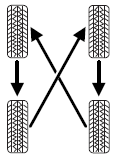Tire rotation

Rotating your tires at the recommended interval (as indicated in the Scheduled Maintenance chapter) will help your tires wear more evenly, providing better tire performance and longer tire life.

Х Front-wheel drive (FWD)/All-wheel drive (AWD) vehicles (front tires at top of diagram)
Sometimes irregular tire wear can be corrected by rotating the tires.
Note: If your tires show uneven wear ask an authorized dealer to check for and correct any wheel misalignment, tire imbalance or mechanical problem involved before tire rotation.
Note: Your vehicle may be equipped with a dissimilar spare tire/wheel. A dissimilar spare tire/wheel is defined as a spare tire and/or wheel that is different in brand, size or appearance from the road tires and wheels. If you have a dissimilar spare tire/wheel it is intended for temporary use only and should not be used in a tire rotation.
Note: After having your tires rotated, inflation pressure must be checked and adjusted to the vehicle requirements.
See also:
Sound Adjustments
Press SOUND repeatedly to cycle through the following features:
BASS: Press
SEEK
to adjust the level of bass.
TREBLE: Press
SEEK
to adjust the level of treble.
BALANCE: Press
SE ...
2012 Lincoln MKT Review
The MKT is an impressive combination of performance, utility, technology and
even affordability among its competition Ч and I want one in my driveway.
When I reviewed the MKT when it debuted for 2 ...
BLIS and/or CTA fault operation
If the BLIS and/or CTA senses a fault on either the left or right sensor,
the BLIS alert indicator will go on and remain on and the message
center will display BLIND SPOT SYSTEM FAULT or CROSS TRA ...
